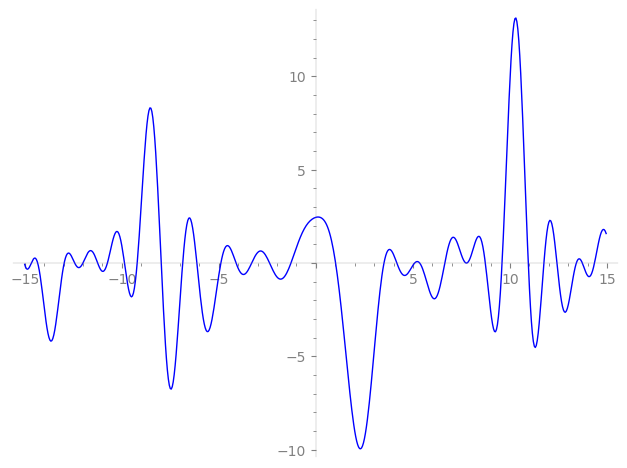| L(s) = 1 | + (1.27 − 2.20i)2-s + (−0.156 − 0.270i)3-s + (−2.22 − 3.85i)4-s + (−1.54 + 2.66i)5-s − 0.795·6-s + (1.63 + 2.08i)7-s − 6.24·8-s + (1.45 − 2.51i)9-s + (3.91 + 6.78i)10-s + (2.10 + 3.64i)11-s + (−0.697 + 1.20i)12-s + (6.65 − 0.946i)14-s + 0.964·15-s + (−3.47 + 6.01i)16-s + (2.98 + 5.16i)17-s + (−3.68 − 6.38i)18-s + ⋯ |
| L(s) = 1 | + (0.898 − 1.55i)2-s + (−0.0903 − 0.156i)3-s + (−1.11 − 1.92i)4-s + (−0.689 + 1.19i)5-s − 0.324·6-s + (0.616 + 0.786i)7-s − 2.20·8-s + (0.483 − 0.837i)9-s + (1.23 + 2.14i)10-s + (0.634 + 1.09i)11-s + (−0.201 + 0.348i)12-s + (1.77 − 0.253i)14-s + 0.248·15-s + (−0.868 + 1.50i)16-s + (0.723 + 1.25i)17-s + (−0.869 − 1.50i)18-s + ⋯ |
Λ(s)=(=(1183s/2ΓC(s)L(s)(0.203+0.979i)Λ(2−s)
Λ(s)=(=(1183s/2ΓC(s+1/2)L(s)(0.203+0.979i)Λ(1−s)
| Degree: |
2 |
| Conductor: |
1183
= 7⋅132
|
| Sign: |
0.203+0.979i
|
| Analytic conductor: |
9.44630 |
| Root analytic conductor: |
3.07348 |
| Motivic weight: |
1 |
| Rational: |
no |
| Arithmetic: |
yes |
| Character: |
χ1183(170,⋅)
|
| Primitive: |
yes
|
| Self-dual: |
no
|
| Analytic rank: |
0
|
| Selberg data: |
(2, 1183, ( :1/2), 0.203+0.979i)
|
Particular Values
| L(1) |
≈ |
2.441184867 |
| L(21) |
≈ |
2.441184867 |
| L(23) |
|
not available |
| L(1) |
|
not available |
L(s)=p∏Fp(p−s)−1 | p | Fp(T) |
|---|
| bad | 7 | 1+(−1.63−2.08i)T |
| 13 | 1 |
| good | 2 | 1+(−1.27+2.20i)T+(−1−1.73i)T2 |
| 3 | 1+(0.156+0.270i)T+(−1.5+2.59i)T2 |
| 5 | 1+(1.54−2.66i)T+(−2.5−4.33i)T2 |
| 11 | 1+(−2.10−3.64i)T+(−5.5+9.52i)T2 |
| 17 | 1+(−2.98−5.16i)T+(−8.5+14.7i)T2 |
| 19 | 1+(−1.50+2.61i)T+(−9.5−16.4i)T2 |
| 23 | 1+(−2.86+4.96i)T+(−11.5−19.9i)T2 |
| 29 | 1−1.74T+29T2 |
| 31 | 1+(−0.336−0.583i)T+(−15.5+26.8i)T2 |
| 37 | 1+(0.539−0.935i)T+(−18.5−32.0i)T2 |
| 41 | 1−8.51T+41T2 |
| 43 | 1+1.23T+43T2 |
| 47 | 1+(5.51−9.55i)T+(−23.5−40.7i)T2 |
| 53 | 1+(1.87+3.24i)T+(−26.5+45.8i)T2 |
| 59 | 1+(2.08+3.60i)T+(−29.5+51.0i)T2 |
| 61 | 1+(−1.50+2.61i)T+(−30.5−52.8i)T2 |
| 67 | 1+(−4.62−8.00i)T+(−33.5+58.0i)T2 |
| 71 | 1−9.19T+71T2 |
| 73 | 1+(−2.17−3.77i)T+(−36.5+63.2i)T2 |
| 79 | 1+(−2.33+4.03i)T+(−39.5−68.4i)T2 |
| 83 | 1−13.0T+83T2 |
| 89 | 1+(−6.87+11.9i)T+(−44.5−77.0i)T2 |
| 97 | 1+12.8T+97T2 |
| show more | |
| show less | |
L(s)=p∏ j=1∏2(1−αj,pp−s)−1
Imaginary part of the first few zeros on the critical line
−9.861246135826927248882361718201, −9.205187279315495932967451165240, −7.967619857779899500668805147013, −6.86065444360385007950873015500, −6.13186274099148917473295853789, −4.89305527162285390862693307897, −4.11533493327683035432610783307, −3.30544129031472545279327246776, −2.39005051324098278917139504739, −1.28206162255038493908372412817,
1.01304595279441183184576138250, 3.50846469753943257383778528657, 4.16582371251339608535247193755, 5.09356598777295933037047571602, 5.33848841664199952442800996397, 6.64096157532265902847195143069, 7.71734671656894112297326500097, 7.79204363544474646877021745908, 8.725123538379872262559146302456, 9.588562256510929063810900768503

